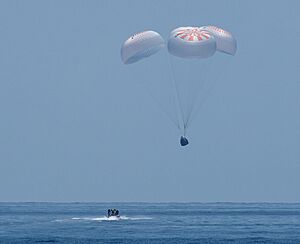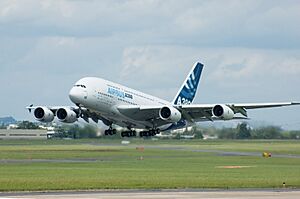Soft landing facts for kids
A soft landing is when an aircraft, rocket, or spacecraft lands gently without getting damaged. It's the opposite of a hard landing, which can harm the vehicle or its cargo. For a soft landing, the vehicle usually touches down at a slow speed, often around 2 meters (about 6.5 feet) per second or even slower.

Contents
How Vehicles Land Gently
Vehicles can achieve a soft landing in several ways. Each method helps slow down the vehicle safely before it touches the ground or water.
Using Parachutes
One common way to land softly is by using parachutes. These large fabric devices create drag, slowing the vehicle's fall. Often, vehicles using parachutes will land in water, a process called Splashdown. This method is very common for spacecraft returning to Earth.
Vertical Rocket Power
Some rockets land using their engines to slow down. This is called vertical rocket power or retrorockets. It's often known as VTVL, which stands for Vertical Takeoff, Vertical Landing. This means the rocket takes off vertically and lands vertically. The first time a rocket achieved this on an orbital flight was with the Surveyor 1 spacecraft.
Horizontal Landings
Most airplanes and some spacecraft, like the former Space Shuttle, land horizontally. They glide down onto a runway, much like a plane landing at an airport. Sometimes, they might use a parachute to help slow down even more after touching the runway.
Catching in Midair
In some special cases, a vehicle might be caught in midair. This was done with Corona spy satellites. After being caught, they would then complete their journey to the ground using another landing method.
Lithobraking
Another method, though less common for planned soft landings, is called lithobraking. This involves reducing landing speed by impacting the surface of a body. While it sounds rough, in some specific designs, it can be a controlled way to slow down a probe.
See also
- List of landings on extraterrestrial bodies
 | Ernest Everett Just |
 | Mary Jackson |
 | Emmett Chappelle |
 | Marie Maynard Daly |



